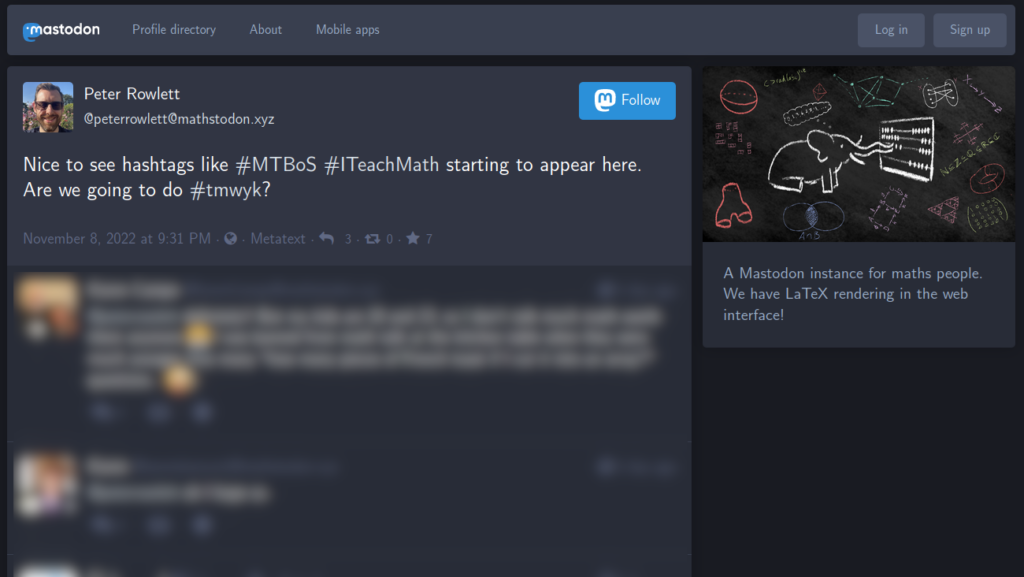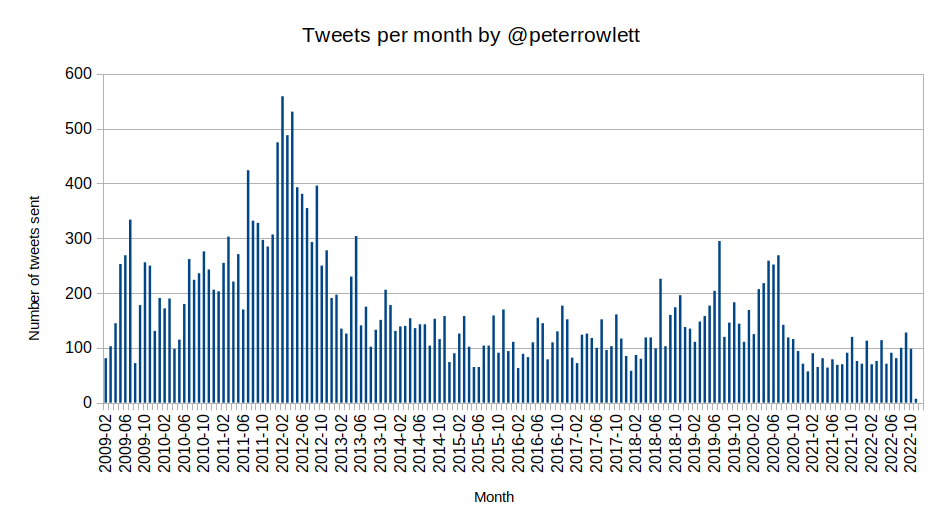Some thinking aloud about what’s happening on social media in my world, I hope you don’t mind.

Me and Twitter
I joined Twitter in February 2009, having considered doing so for about a year. I wrote on this blog at the time that “Now it is really taking off I have decided to give it a go for a trial period”. I didn’t really define the trial or what I wanted out of it, but I sent my first tweet and stuck with it.
Before and since, I didn’t sustain various other social media. Some I tried and didn’t stick with, for example I was on Facebook for five minutes a dozen years ago and it irritated me, plus I played around with writing an app for it and realised quite how much data app developers had access to and didn’t like it. Some I am on but don’t much use, like LinkedIn.
For some reason, Twitter stuck. I think back then I liked its low-fi, immediate nature – a focus on ‘What are you doing?’ and the necessity to post short messages. There were and are still a nice community of mathsy people posting interesting things.
I feel like I’ve been doing less with Twitter over time. I decided to interrogate this hypothesis, so this morning I plotted the number of tweets I’ve sent each month.

It seems my interest (in terms of posting messages) peaked in 2012, and following a little bump in the first year of the pandemic has dropped to its lowest level in 2021-22. The number of tweets peaked at around 380 per month in 2012, has mostly been in the 100s per month but has dropped to 70-80 per month since late 2020.
I can’t really explain why this is, but definitely changes to the system over time have made harder to engage with. For a long time I’ve read tweets through some code I wrote to pull via the API a set of tweets – specific people, certain search terms and a random sampling from my wider pool of followers. So I’ve never been bothered as a reader by its algorithmic shenanigans, but I am aware of some of the impacts it has. Also I haven’t experienced some of the horror that others have. For whatever reason, it seems I still read Twitter, but I engage less than I once did.
Following the Elon Musk Twitter purchase, it seems there is suddenly a lot of interest in alternatives like Mastodon.
But Mastodon is hard
I joined Mastodon in 2017 when Christian Lawson-Perfect (who runs The Aperiodical) and Colin Wright set up Mathstodon. I liked the idea of an independent social network that renders maths (via MathJax, like The Aperiodical). But it didn’t stick. I suppose it’s hard to do both at once and the number of other users means if I post to Twitter I get more interaction (people answering if I ask a question, liking a thing I made, etc., all of which is nice).
I am not especially bothered that Mastodon is conceptually more complicated, except if it puts other people off joining. It’s federated, but so are lots of things. If I want to send a postcard to a friend in America, I give it to my local post office, it makes its way through the UK system, gets shipped to America and makes its way through the US system to my friend. I might wonder what on Earth a zip code is and why it’s different from my familiar postcode, but I don’t really need to worry about this. The fact I’m in one system and my friend is in another is taken care of by the systems. Loads of things work like this. If my email is on Outlook, yours is on Gmail and a third person runs their own server, who cares? We can still email each other just fine. So it is on Mastodon – different people on different instances, but everyone can follow each other and exchange messages. I had the thorny ‘which instance do I trust?’ issue dealt with because I know Christian and Colin and trust them, so I set up my account on Mathstodon.
I think what made Mastodon hard to engage with is that there weren’t as many people there. So now the community has grown and a bunch of new people are trying it out, I’ve started opening it more and I’m trying to read and post there.
What I want from social media
I think what I want is a nice community of people with similar interests – maths, teaching maths (especially at university), etc. I’d like this to entertain and inform me – not inform about the mainstream news, necessarily (which the tweets I read have become more and more about), but about what’s going on in the mathematical world that I might not find out about otherwise. I’d like this community to engage with stuff I make or do – it’s really nice when someone riffs on something you’ve done or teaches you something about it. I’d like to ask it questions, to be surprised by it, to stumble on wonderful things I wouldn’t have known otherwise. For a while now I’ve heard journalists and others talk about Twitter as exclusively a horrible place where bad things happen, and I think ‘I post a fun maths thing and people like it, or I saw someone share something interesting I liked. It isn’t like that for me.’ But to get this from social media doesn’t require Twitter, its just that Twitter has provided that. Fundamentally, we don’t need to have this nice niche community enjoying itself in a quiet bubble within a large platform that also polarises, upsets and harasses so many. The upside could happen just fine on Mathstodon.
Inertia
I’m wondering if writing this has organised my thoughts and convinced me to switch. I’ve been running both in parallel for the past couple of weeks and honestly I’ll probably keep doing that. At first, the people finding me on Mathstodon were not the most diverse bunch – techy heavy, for example – but this second week I’ve started to see a greater range of interests and some familiar faces from Twitter popping up in my new followers. There are some people who have switched and I now see in both places. There are others who haven’t and I don’t want to leave behind. Fundamentally, I have 15k people on Twitter and a couple of hundred on Mastodon, and it’s hard to disconnect from the 15k. It’s also about finding a nice way to use Mastodon that fits into my life.
Still, I’ve decided to consciously speed up my detachment from Twitter. I’ve turned down the volume of tweets I see and started checking and posting to Mastodon more often, including stuff I haven’t also posted to Twitter. Let’s call it a trial period, and see how it goes.
One Response to “Twitter and Mathstodon”